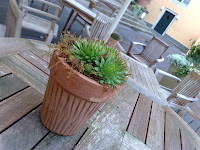 We got samples for USB sticks for the proceedings of the automotive conference – which one do you like best?
We got samples for USB sticks for the proceedings of the automotive conference – which one do you like best?
Monat: Juli 2009
Auto-UI Conference accepts 12 full papers and 10 notes
For the 1st International Conference on Automotive User Interfaces and Interactive Vehicular Applications (AutomotiveUI 2009) we got many quality submissions. The review process is now complete and we accepted 12 full papers and 10 notes for oral presentation at the conference. The list of accepted contributions is online at auto-ui.org.
As a number of people have asked if the still can submit to the program and as many of the rejected papers raise interesting aspects we decided to have Posters as a further submission category. We have a continuous submission process for poster abstracts till Sept 1st 2009. Earlier submissions receive feedback within 2 weeks. For details see the poster call for AutomotiveUI 2009.
If you submit somit your poster abstract during the next week, you will get the notification before the early registration deadline, which is August 6, 2009.
The registration is open and the conference is held in Essen, Mon/Tue 21 – 22 September 2009 – right after mobile HCI 2009 (which is in Bonn, just 100km away).
Faculty meeting in Velen
 Friday and Saturday we came to Velen (Hotel SportSchloss Velen) to discuss mainly administrative and strategic issues – and there are plenty. The place is amazing and I was annoyed with myself for not bring my SLR… Nevertheless I took some photos with my N95.
Friday and Saturday we came to Velen (Hotel SportSchloss Velen) to discuss mainly administrative and strategic issues – and there are plenty. The place is amazing and I was annoyed with myself for not bring my SLR… Nevertheless I took some photos with my N95.

 Such meetings highlight for me that the German scientific system is undergoing a major change – with many opportunities and risks. A lot of political constraints are pushed onto the university – many seem to be just copies of other systems that are working less than perfect (e.g. bachelor/master, research evaluation, etc.). Being optimistic and seeing the creativity of my colleagues I think we will find interesting and successful solutions.
Such meetings highlight for me that the German scientific system is undergoing a major change – with many opportunities and risks. A lot of political constraints are pushed onto the university – many seem to be just copies of other systems that are working less than perfect (e.g. bachelor/master, research evaluation, etc.). Being optimistic and seeing the creativity of my colleagues I think we will find interesting and successful solutions.
DIY Segway – to motivate embedded programming?
 Elektor magazine features in the current issue a DIY Segway called Elektor Wheelie. The system is build around a ATMEGA32 and has obviously a lot of mechanics. For sensing an ADXL320 (acceleration sensor) and an IDG-300 (gyro) are used. Looks like a fun project – and you have full access to the software (not sure what you really would program differently, perhaps one can tune it to get faster 😉
Elektor magazine features in the current issue a DIY Segway called Elektor Wheelie. The system is build around a ATMEGA32 and has obviously a lot of mechanics. For sensing an ADXL320 (acceleration sensor) and an IDG-300 (gyro) are used. Looks like a fun project – and you have full access to the software (not sure what you really would program differently, perhaps one can tune it to get faster 😉
Perhaps it could be a platform to motive embedded programming – with clear real-time constraints, as it hurts if you fall off… Next term we are teaching digital system design and programming of microcontroller systems – should we get one for the lab? Someone willing to built it?